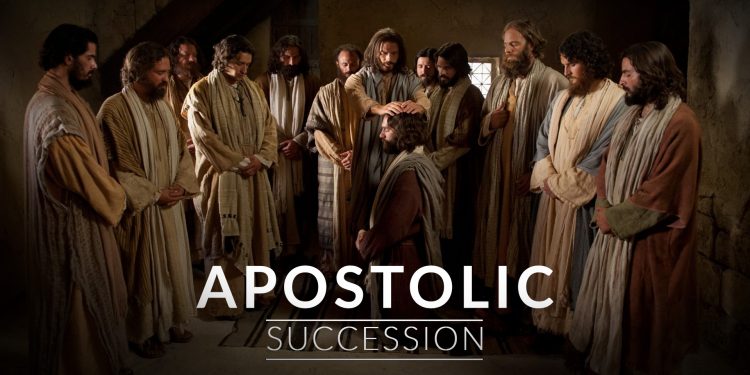Apostolic Succession

Hebrews 6:1-3 presents a fascinating insight into the doctrine of Apostolic Succession:
Therefore, let us leave the elementary doctrines of Christ and go on to maturity, not laying again a foundation of repentance from dead works and of faith toward God, with instruction about ablutions, the laying on of hands, the resurrection of the dead, and eternal judgment. And this we will do if God permits.
Notice, the inspired author of Hebrews lists 1. Repentance and faith toward God. 2. Instruction about “ablutions” (Gr. Baptismon, which means “baptisms”). 3. The laying on of hands (that’s our topic). 4. The resurrection of the dead. 5. Eternal judgment, as “elementary doctrines.” These are teachings everybody should know. Yet, with the advent of the Protestant rebellion of the 16th century, each of these topics have manifold different definitions depending upon the Protestant sect, or quasi-Christian sect, you may happen upon.
Tragic.
In this article, I want to focus on the “laying on of hands.” That phrase has multiple applications in the New Testament and in Catholic theology. Confirmation is referred to as including the “laying on of hands” in both Acts 19:6 and Acts 8:14-17. The Anointing of the Sick as well:
Is any among you sick? Let him call for the elders of the church, and let them pray over him, anointing him with oil in the name of the Lord; and the prayer of faith will save the sick man, and the Lord will raise him up; and if he has committed sins, he will be forgiven (James 5:14-15).
The “anointing… with oil” necessarily involves “the laying on of hands” as CCC 1519 explains:
The celebration of the sacrament includes the following principal elements: the “priests of the Church” – in silence – lay hands on the sick; they pray over them in the faith of the Church – this is the epiclesis proper to this sacrament; they then anoint them with oil blessed, if possible, by the bishop (see also CCC 1507).
CCC 1508 also informs us that “the laying on of hands” can also refer to the charismatic gift of healing in the lives of the faithful.
But for our purpose now, the “laying on of hands” also refers to the Sacrament of Holy Orders and Apostolic Succession. CCC 1597:
The sacrament of Holy Orders is conferred by the laying on of hands followed by a solemn prayer of consecration asking God to grant the ordinand the graces of the Holy Spirit required for his ministry. Ordination imprints an indelible sacramental character.
What Does the Bible Say?
In the New Testament, we find “the laying on of hands” to refer to Holy Orders in the plainest of terms. St. Paul, for example, refers to Holy Orders when he warns against “be[ing] hasty in the laying on of hands” in I Tim. 5:22. In context, this was just after he gave instructions regarding the qualifications necessary for ordained ministry in chapter 3 of this same letter. In other words, he is saying words to the effect of: “Don’t just ordain anyone. You must be sure the ordinandi are truly prepared for ministry.” St. Paul has grave concern because this is a grave matter. In fact, in I Tim. 4:16, he would specifically warn St. Timothy in the strongest of terms that the salvation of souls is on the line when it comes to the living of the manifold responsibilities that accompany this august sacrament:
Take heed to yourself and to your teaching; hold to that, for by so doing you will save both yourself and your hearers (I Tim. 4:16).
St. Paul had a special interest in St. Timothy because he himself had ordained him to the priesthood (probably to the bishopric). Notice, the language St. Paul uses in reminding young St. Timothy of the on-going challenge of his office:
… rekindle the gift of God that is within you through the laying on of my hands (II Tim. 1:6).
Thus, there can be no reasonable doubt that “the laying on of hands” refers to Holy Orders in the New Testament. But the question now is: How does this relate to apostolic succession? There are at least six points we would do well to consider:
- To understand apostolic succession, we must understand the biblical concept of being “sent.” In CCC 858, the Catechism quite deftly uses John 20:21 as an example of this: “As the Father has sent me, even so I send you…” The Greek word there for “send” is a form of “apostello.” Does that sound familiar? Yes, “apostolos” is the noun form of the same root. This is not “sending” in the sense of sending a letter. It has a specific connotation of “one sent with the authority of the one who sent him.” Thus, according to Jesus, his New Covenant ministers were not just “sent” in a generic sense; rather, they were “sent” by and with his authority—the authority of Christ.
Understanding this idea properly has ramifications with regard to the infallibility of the Church, her juridical authority, and more. Think about it: if Christ’s ministers are “sent” with the authority of Christ, infallibility necessarily follows. Jesus did not teach mere opinions of what he thought Scripture might mean. He spoke the infallible word of God! So must his ministers! Now, Jesus did limit this infallible authority he gifted to the apostles in both Matt. 16:18-19, when he communicated it to St. Peter and his successors. And in Matt. 18:15-18, when he communicated a similar authority to all of the apostles and their successors in union with St. Peter and his successors. He limited it to “whatever you bind” or “loose (singular) on earth” when speaking to St. Peter and his successors. And he limited it to “whatever you bind” or “loose” (plural) when speaking to all of the apostles and their successors in union with St. Peter and his successors.
An in-depth discussion of these limiting details is beyond the scope of this article.
But unfortunately, this basic concept of the communication of apostolic authority has been so muddled with the advent of Protestantism that there are literally thousands of sects all claiming to be “sent” by God while teaching contradictory doctrines even concerning those “foundational” teachings the inspired author of Hebrews recounted as “elementary.”
But from a New Testament standpoint, apostolic authority is so foundational, so basic, that the idea of anything less is unthinkable. So radical is this apostolic authority that Jesus communicated to his ministers that he could say of those he “sent:” “He who hears you hears me, and he who rejects you rejects me, and he who rejects me rejects him who sent me” (Luke 10:16; cf. Matt. 10:40). To claim there could be thousands of differing sects, or “denominations” as they are called today, speaking different teachings after having been “sent” by Christ, is absolutely foreign to the teachings of Christ in the New Testament.
- In CCC 1122, the Catechism introduces another crucial phrase into this discussion in close relation to the essential notion of what it means to be “sent:”
“Christ sent his apostles so that ‘repentance and forgiveness of sins should be preached in his name to all nations’” (quoting Luke 24:47).
In his name is, unfortunately, another phrase in the New Testament that has been greatly reduced and misunderstood among the multitudinous Protestant sects. When Jesus said, “I come in my Father’s name and you do not receive me; if another comes in his own name, him you will receive” (John 5:43-44), he really does say it all! When Jesus speaks “in the name of” his Father, he purposefully and absolutely leaves no wiggle room around his words. To reject him is to reject his Father. Period. In the same way, he sends his apostles to speak “in his name.” And he very purposefully and absolutely does the same thing; he leaves no wiggle room once again. To reject the apostles is to reject Jesus. This is the essence of what it means to speak or act “in the name of Jesus.” And this is the essence of apostolic succession with regard to New Testament teaching authority.
- According to Scripture, the apostles ordained others to succeed them in their ministry as well. And this is more than implied to continue in the Church perennially. This is why Jesus could give perennial instructions as to what his followers are to do in the case of serious division among them:
“If your brother sins against you, go and tell him his fault, between you and him alone. If he listens to you, you have gained your brother. But if he does not listen, take one or two others along with you, that every word may be confirmed by the evidence of two or three witnesses. If he refuses to listen to them, tell it to the church; and if he refuses to listen even to the church, let him be to you as a Gentile and a tax collector. Truly, I say to you, whatever you bind on earth shall be bound in heaven, and whatever you loose on earth shall be loosed in heaven.”
Just as Jesus “sent” the apostles, the apostles would send men as well. And those men would send men… until the end of time. Again, that is the definition of apostolic succession. And this is made clear in the New Testament not only by the above-cited text, which is incoherent apart from a proper understanding of apostolic succession, but by the idea of the absolute necessity of being “sent” by proper authority in the Church beyond the apostles. More about that in point #5 below.
But for now, one crucial note: CCC 860 makes clear, “In the office of the apostles there is one aspect that cannot be transmitted: to be the chosen witnesses of the Lord’s Resurrection and so the foundation stones of the Church” (referencing Eph. 2:20; Rev. 21:14). The original apostles possessed a unique gift that cannot “succeed” to the bishops. However, the Catechism goes on to say, “… their office also has a permanent aspect. Christ promised to remain with them always. The divine mission entrusted by Jesus to them ‘will continue to the end of time, since the Gospel they handed on is the lasting source of all life for the Church. Therefore, . . . the apostles took care to appoint successors.” The Catechism here quotes the ancient Letter of St. Clement to the Corinthians, 42; 44, written in the late first century, in order to emphasize the apostolic origin of the dogma of apostolic succession, which has as one of its central purposes infallible certainty with regard to the promise of Christ to remain with the Church until the end of time. In Matt. 28:20, Jesus said, “Lo, I will be with you always, even to the end of the age.” This promise was given in the specific context of the sending of the apostles to the ends of the earth. The implication being that the apostolic gift would continue until the end in their successors, the bishops.
- Apostolic authority is also seen to succeed in the Church in the choosing of the replacement (successor) of Judas. St. Peter declared, in Acts 1:15-22:
In those days Peter stood up… and said, “Brethren, the scripture had to be fulfilled, which the Holy Spirit spoke beforehand by the mouth of David, concerning Judas who was guide to those who arrested Jesus… For it is written in the book of Psalms, “Let his habitation become desolate, and let there be no one to live in it”; and “His office let another take.”
The Greek word here for “office” is a form of “episcope,” or “bishopric.” Thus, the office of apostle in succession is referred to as “tein episkopein” or “the episcopacy.” According to I Tim. 3:1, that office continues in the Church beyond the original apostles. This becomes obvious when we consider St. Paul listed various essential qualifications for the Church to consider in choosing bishops down through the centuries.
The bishop being the successor of the apostle is most likely why St. Paul seems on the surface to omit “bishops” when he lists the New Covenant hierarchy of “apostles, prophets, pastors, teachers and evangelists,” in Eph. 4:11-14. But he didn’t omit anything. He had just made clear that “the Church” he is describing was to exist as such “in every generation world without end” (Eph. 3:21). He did not need to list “bishop” here in Ephesians because the bishop is the successor of the apostle.
- Not only did Jesus “send” the apostles, but the apostles “sent” others as well as commissioned those “sent ones” to “send” others. The truth is: being “sent” by an apostle or someone sent by an apostle is just as necessary if one is going to be an official representative of Jesus in the Church after the apostles as it was for the apostles themselves to be sent by Jesus. Here are two examples of this fact:
… if you confess with your lips that Jesus is Lord and believe in your heart that God raised him from the dead, you will be saved. For man believes with his heart and so is justified, and he confesses with his lips and so is saved… But how are men to call upon him in whom they have not believed? And how are they to believe in him of whom they have never heard? And how are they to hear without a preacher? And how can men preach unless they are sent (Romans 10:9-15)?
The Greek word for “sent” here is apostalosin. Thus, unless you are sent with apostolic authority, you have no authority in the Church, according to St. Paul. You speak in your own name, rather than the name of Jesus Christ. So who are these “sent ones” that Paul talks about? St. Timothy certainly qualifies, as we saw from II Tim. 1:6: “I remind you to rekindle the gift of God that is within you through the laying on of my hands.”
Moreover, St. Paul encourages Timothy to “send” others in II Tim. 2:1-2:
You then, my son, be strong in the grace that is in Christ Jesus, and what you have heard from me before many witnesses entrust to faithful men who will be able to teach others also.
And remember, St. Paul is not just talking about “teachers” as in a Sunday school teacher. I and II Timothy are both pastoral epistles that focus on the pastoral ministry of the ordained. For example, when he speaks of “teachers” in I Tim. 2:12-15, he is talking about the ordained, official “teachers” who proclaim the Faith in a liturgical setting.
Titus 1:5 is another example:
This is why I left you in Crete, that you might amend what was defective, and appoint elders in every town as I directed you.
- In Acts 15, we find the first major heresy in the Church that threatened to tear a fledgling Church apart. Today we refer to this heresy as the “Judaizer Heresy.” And it is because of the reality of apostolic succession that we can say the way in which that heresy was dealt with in the first century represents the same manner in which we deal with error today. We listen to those “sent” by those who were “sent” by an apostle in union with St. Peter.
The issue in Acts 15 was the role of the Old Covenant and the grace of God in the life of Christians. The details of the controversy are for another time and another article. But for now, take note how the early Church in the midst of this enormous controversy about which a Church Council had been called, and the matter discussed—settled the difficulty. An epistle was written and sent by the apostles to the troubled churches:
Since we have heard that some persons from us have troubled you with words, unsettling your minds, although we gave them no instructions (Gr. – diasteila’metha, commandment/mandate): it has seemed good to us in assembly to choose men and send them to you with our beloved Barnabas and Paul… For it has seemed good to the Holy Spirit and to us to lay upon you no greater burden than these necessary things… (Acts 15:24-28)
Notice here that not only does one have to be “sent” initially with apostolic authority, by way of ordination, but one has to maintain union with the apostles or their successors, the bishops, by way of an apostolic mandate as well.
And in Acts 16:4-5, we see how unity is maintained in the Church:
As they went on their way through the cities, they delivered to them for observance the decisions which had been reached by the apostles and elders who were at Jerusalem. So the churches were strengthened in the faith, and they increased in numbers daily.
Unfortunately, not everyone believed and obeyed these “decisions… reached by the apostles and elders.” In fact, according to Scripture and tradition, there would sadly arise a rebellious sect led by one of the first seven deacons ordained in Acts 6 (vs. 5), “Nicola′us, a proselyte of Antioch.” Not coincidentally, notice, he was from Antioch, where the trouble started, according to Acts 14:26. Evidently, he rejected the decisions of the Council, no doubt, claiming the authority of a member of the clergy.
But Jesus, it seems, did not agree with him! Decades later, Jesus himself had a message for Nicola’us and his followers. First, Jesus says to the Church at Ephesus:
Remember then from what you have fallen, repent and do the works you did at first. If not, I will come to you and remove your lampstand from its place, unless you repent. Yet this you have, you hate the works of the Nicola′itans, which I also hate. He who has an ear, let him hear what the Spirit says to the churches (Rev. 2:5-7).
And then, to the Church at Pergamum:
So you also have some who hold the teaching of the Nicola′itans. Repent then. If not, I will come to you soon and war against them with the sword of my mouth. He who has an ear, let him hear what the Spirit says to the churches (Rev. 2:15-17).
In the second century, one of the greatest bishops and defenders of the Faith in the second century, St. Irenaeus, said this of these “Nicolaitans:”
The Nicolaitans are the followers of that Nicolas who was one of the seven first ordained to the diaconate by the apostles. They lead lives of unrestrained indulgence. The character of these men is very plainly pointed out in the Apocalypse of John, [when they are represented] as teaching that it is a matter of indifference to practice adultery, and to eat things sacrificed to idols. Wherefore the Word has also spoken of them thus: But this you have, that you hate the deeds of the Nicolaitans, which I also hate [citing] Revelation 2:6 (Against Heresies, Bk. 1, ch. 26, para. 3).
And this is in the context of a letter where St. Irenaeus teaches the essential nature of apostolic succession when he says, in Bk. 3, ch. 3, para. 1:
It is within the power of all, therefore, in every Church, who may wish to see the truth, to contemplate clearly the tradition of the apostles manifested throughout the whole world; and we are in a position to reckon up those who were by the apostles instituted bishops in the Churches, and [to demonstrate] the succession of these men to our own times; those who neither taught nor knew of anything like what these [heretics] rave about…
And then, in para. 2-3:
Since, however, it would be very tedious, in such a volume as this, to reckon up the successions of all the Churches, we do put to confusion all those who, in whatever manner, whether by an evil self-pleasing, by vainglory, or by blindness and perverse opinion, assemble in unauthorized meetings; [we do this, I say,] by indicating that tradition derived from the apostles, of the very great, the very ancient, and universally known Church founded and organized at Rome by the two most glorious apostles, Peter and Paul; as also [by pointing out] the faith preached to men, which comes down to our time by means of the successions of the bishops. For it is a matter of necessity that every Church should agree with this Church, on account of its preeminent authority [potiorem principalitatem].
The blessed apostles, then, having founded and built up the Church [Peter, having founded it, and St. Paul having aided in “building it up” as we see St. Paul himself say in Romans 15:18-24], committed into the hands of Linus the office of the episcopate…
St. Irenaeus then lists the succession of bishops from St. Peter all the way to his own time, concluding:
Eleutherius does now, in the twelfth place from the apostles, hold the inheritance of the episcopate. In this order, and by this succession, the ecclesiastical tradition from the apostles, and the preaching of the truth, have come down to us. And this is most abundant proof that there is one and the same vivifying faith, which has been preserved in the Church from the apostles until now, and handed down in truth.
The message seems clear. The true Church—whether in the first century, the second century, or the 21st century—speaks with the authority of Christ. That is, the true Church that possesses the gift of the apostolic succession of bishops in union with St. Peter and his successors. If you reject this Church, you reject Jesus. That is at the core of the truth of apostolic succession.






